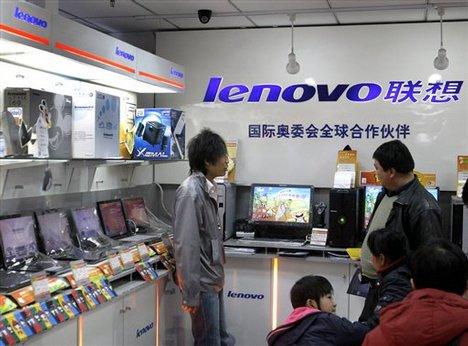
Customers make inquiries at a Lenovo store inside a computer market.
Chinese computer maker, Lenovo Group, said on Thursday that rising labor costs in southern regions during the past few months will have little impact on the company's profitability.
But the world's fourth-largest personal computer (PC) maker also said it is in talks with several cities in western parts of the country to build new factories in inland regions.
"Labor costs only accounted for a small proportion of our total costs. That will not have a significant impact on our profitability," said Yang Yuanqing, chief executive officer of Lenovo.
He estimated that key computer components accounted for about 60 to 70 percent of the company's total costs, while labor costs make up only 2 to 3 percent.
China's labor costs in coastal regions have increased 20 percent to 25 percent in the first half of this year, after a series of suicides at Foxconn's Shenzhen plant and strikes at Japanese automaker Honda's domestic suppliers in Guangdong province, according to official figures.
That has spurred many technology companies to move their production capacities to inland regions or even neighboring countries where labor costs remain low.
Yang said on Thursday that the company is in talks with several western Chinese cities to build new factories to meet increasing demand.
He also said he is optimistic about the global PC market outlook and expects demand from corporate replacement of old computers in mature markets to gradually improve in the following quarters.
Worldwide shipments of Lenovo grew 48.1 percent in the first fiscal quarter ended June from a year earlier, outpacing the industry's growth rate of 20.9 percent, according to the company.
That boosted Lenovo's share in the global market to 10.2 percent, its first double-digit figure to date, Lenovo said.
Liu Chuanzhi, chairman of Lenovo, said on Thursday that the company has already "gotten away from the cliff" after robust growth during the past few quarters. He said the company plans to increase its profit margin by intensifying its capacity to launch innovative products.
In May, Lenovo launched an Android-based smartphone called LePhone in China. Yang said on Thursday the company had sold over 100,000 LePhones in the first one and a half month since its launch. He reiterated that the computer company could achieve its goal of selling over 1 million LePhone within one year.
Lenovo was badly hit by the global economic crisis, during which its core corporate customers slashed computer purchases. The company suffered three losing quarters before rebounding to profit in the three months ending last September.
According to IDC, global PC shipments rose 22 percent in the second quarter, a sign that consumer demand is picking up amid lingering concerns about the pace of the economic recovery.
Antonio Wang, an analyst from IDC, said China's PC market has fully recovered from the global financial crisis. But he predicted that the growth may show signs of slowing during the following quarter, after a faster-than-estimated market rebound last year.
In China, Lenovo's sales rose to $2.5 billion, accounting for 48.7 percent of worldwide sales. Yang said China is expected to outpace the United States to become the world's biggest PC market in the next couple of years.





